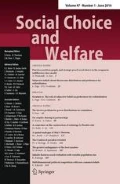Abstract
We study the optimal design of an organization in which a team of fallible individuals with heterogeneous abilities collectively decides whether to accept or reject projects. Conventional wisdom tells us that the opinion of those individuals with better decision-making abilities should be given a “larger” weight in the decision. We formalize this intuition in a sequential evaluation process and provide specific ways to characterize the optimal decision weights, as well as demonstrate that the magnitude of the weights depends on the relative abilities of the decision-makers, as well as where the decision-makers are placed in the project evaluation sequence.
Similar content being viewed by others
References
Astrom KJ (1970) Introduction to stochastic control theory. Academic, New York
Ben-Yashar R, Kraus S (2002) Optimal collective dichotomous choice under quota constraints. Econ Theory 19:839–852
Ben-Yashar R, Nitzan S (1997) the optimal decision rule for fixed size committees in dichotomous choice situations: the general result. Int Econ Rev 38(1):175–187
Ben-Yashar R, Nitzan S (1998) Quality and structure of organizational decision making. J Econ Behav Org 36:521–534
Ben-Yashar R, Nitzan S (2001) The robustness of optimal organizational architectures: a note on hierarchies and polyarchies. Soc Choice Welf 18:155–163
Ben-Yashar R, Paroush J (2001) Optimal decision rules for fixed-size committees in polychotomous choice situations. Soc Choice Wel 18:737–746
Bertsekas DP (1987) Dynamic programming: deterministic and stochastic models. Prentice-Hall, Inc., Englewood Cliffs
DeGroot MH (1970) Optimal statistical decisions. McGraw Hill, New York
Koh WTH (1992a) Variable evaluation costs and the design of fallible hierarchies and polyarchies. Econ Lett 38: 313–318
Koh WTH (1992) Human fallibility and sequential decision-making: hierarchy versus polyarchy. J Econ Behav Org 18:317–345
Koh WTH (1994) Making decisions in committees: a human fallibility approach. J Econ Behav Org 23:195–214
Koh, WTH (2005) Optimal sequential decision architectures and the robustness of hierarchies and polyarchies. Soc Choice Welf 25:207–220
Nitzan S, Paroush J (1980) Investment in human capital and social self protection. Int Econ Rev 21:547–557
Nitzan S, Paroush J (1982) Optimal decision rules in uncertain dichotomous choice situations. Int Econo Rev 23: 289–297
Nitzan S, Paroush J (1984) The significance of independent decisions in uncertain dichotomous choice situations. Theory Decis 17 (1):47–60
Nitzan S, Paroush J (1985) Collective decision-making: an economic outlook. Cambridge University Press, London
Sah R (1990) An explicit closed-form formula for profit-maximizing k-out-of-n systems subject to two kinds of failures. Microelectron Reliabil 30:1123–1130
Sah R (1991) Fallibility in human organizations and political systems. J Econ Perspect 5:67–88
Sah R, Stiglitz J (1986) The architecture of economic systems: hierarchies and polyarchies. Am Econ Rev 76:716–727
Sah R, Stiglitz J (1988) Committees, hierarchies and polyarchies. Econ J 98:451 – 470
Stiglitz J (2002) Information and the change in the paradigm in economics. Am Econ Rev 92(3):460–501
Author information
Authors and Affiliations
Corresponding author
Rights and permissions
About this article
Cite this article
Koh, W.T.H. Heterogeneous expertise and collective decision-making. Soc Choice Welfare 30, 457–473 (2008). https://doi.org/10.1007/s00355-007-0242-3
Received:
Accepted:
Published:
Issue Date:
DOI: https://doi.org/10.1007/s00355-007-0242-3




